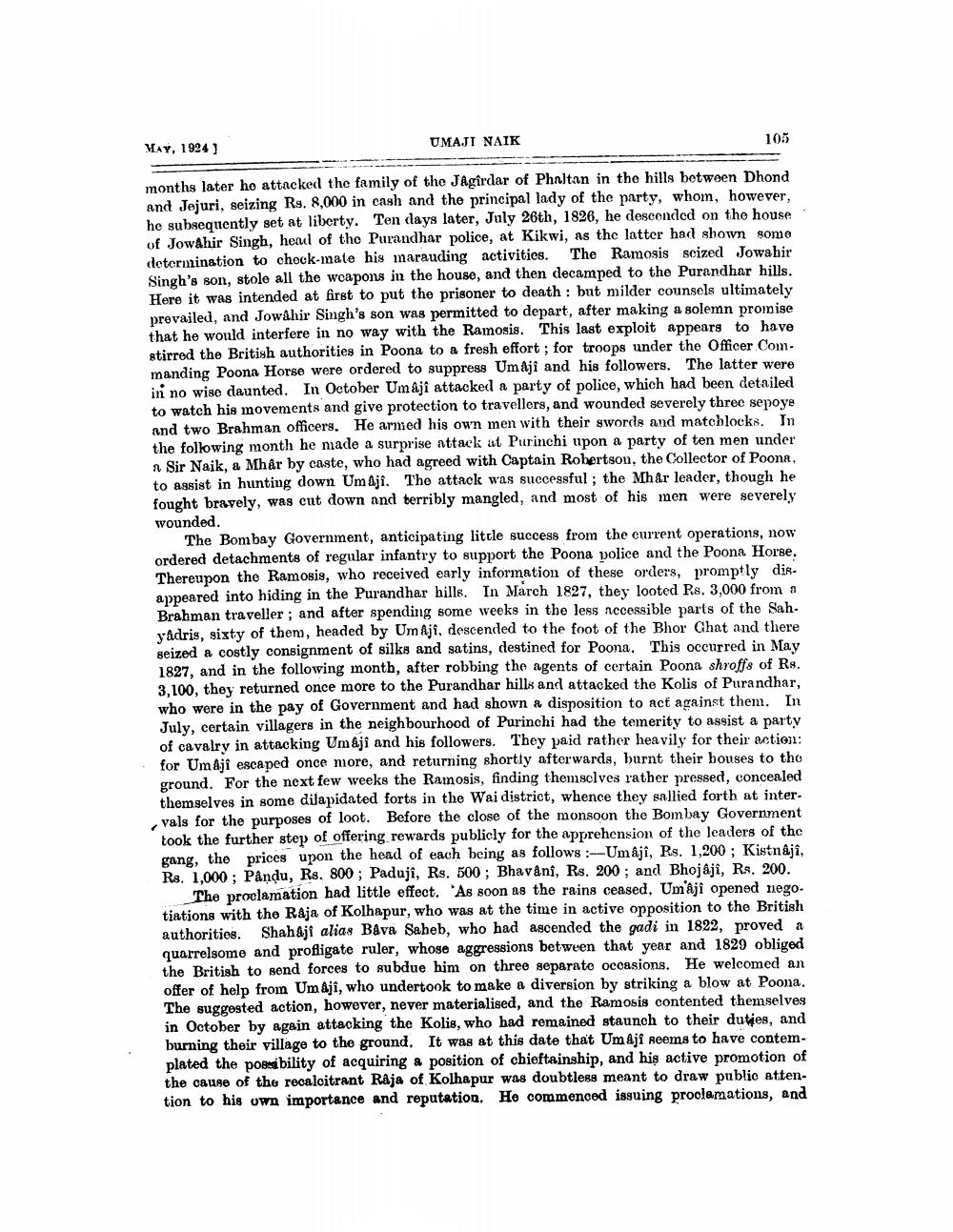________________
MAY, 1924 )
UMAJI NAIK
105
months later ho attacked the family of tho Jagirdar of Phaltan in the hills betwoen Dhond and Jejuri, seizing Rs. 8,000 in cash and the principal lady of the party, whom, however, he subsequently set at liberty. Ten days later, July 26th, 1826, he descended on the house of Jowahir Singh, head of the Purandhar police, at Kikwi, as the latter had shown some determination to chock-mate his marauding activities. The Ramosis scized Jowahir Singh's son, stole all the weapons in the house, and then decamped to the Purandhar hills. Here it was intended at first to put the prisoner to death: but milder counsels ultimately prevailed, and Jowahir Singh's son was permitted to depart, after making a solemn promise that he would interfere in no way with the Ramosis. This last exploit appears to have stirred the British authorities in Poona to a fresh effort ; for troops under the Officer Com. manding Poona Horse were ordered to suppress Umaji and his followers. The latter were in no wise daunted. In October Umaji attacked a party of police, which had been detailed to watch his movements and give protection to travellers, and wounded severely three sepoye and two Brahman officers. He armed his own men with their swords and matchlocks. In the following month he made a surprise attack at Purinchi upon a party of ten men under * Sir Naik, a Mhår by caste, who had agreed with Captain Robertson, the Collector of Poona, to assist in hunting down Um Aji. The attack was successful; the Mhar leader, though he fought bravely, was cut down and terribly mangled, and most of his men were severely wounded.
The Bombay Government, anticipating little success from the current operations, now ordered detachments of regular infantry to support the Poona police and the Poona Horse. Thereupon the Ramosis, who received early information of these orders, promptly disappeared into hiding in the Purandhar hills. In March 1827, they looted Rs. 3,000 from a Brahman traveller ; and after spending some weeks in the less nccessible parts of the Sahvadris, sixty of them, headed by Um Aji, descended to the foot of the Bhor Chat and there seized a costly consignment of silks and satins, destined for Poona. This occurred in May 1827, and in the following month, after robbing the agents of certain Poona shroffs of Rs. 3,100, they returned once more to the Purandhar hills and attacked the Kolis of Purandhar, who were in the pay of Government and had shown a disposition to act against them. In July, certain villagers in the neighbourhood of Purinchi had the temerity to assist a party of cavalry in attacking Umaji and his followers. They paid rather heavily for their action: for Um Aji escaped once more, and returning shortly afterwards, burnt their houses to the ground. For the next few weeks the Ramosis, finding themselves rather pressed, concealed themselves in some dilapidated forts in the Wai district, whence they sallied forth at intervals for the purposes of loot. Before the close of the monsoon the Bombay Government took the further step of offering rewards publicly for the apprehension of the leaders of the gang, the prices upon the head of each being as follows Um Aji, Rs. 1,200 ; Kistnaji, Rs. 1,000; Pându, Rs. 800 ; Paduji, Rs. 500; Bhavâni, Rs. 200; and Bhojājî, Rs. 200.
The proclamation had little effect. 'As soon as the rains ceased, Umáji opened negotiations with tho Raja of Kolhapur, who was at the time in active opposition to the British authoritios. Shahaji alias Bava Saheb, who had ascended the gadi in 1822, proved a quarrelsome and profligate ruler, whose aggressions between that year and 1829 obliged the British to send forces to subdue him on three separato occasions. He welcomed an offer of help from Umaji, who undertook to make a diversion by striking a blow at Poona. The suggested action, however, never materialised, and the Ramosis contented themselves in October by again attacking the Kolis, who had remained staunch to their duties, and burning their village to the ground. It was at this date that Umáji seems to have contemplated the possibility of acquiring a position of chieftainship, and his active promotion of the cause of the recalcitrant Raja of Kolhapur was doubtless meant to draw public atten. tion to his own importance and reputation. He commenced issuing proolamations, and




